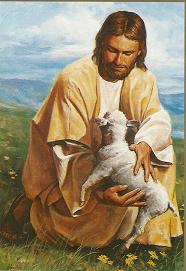
I submit that Jesus is not excluding anyone from his love. Yet here he is clearly praying very specifically for these eleven men. It might seem that his love excludes some if we had only had these words. But we have numerous other verses in this same Gospel which tell us otherwise. The most prominent is John 3:16 which says God “gave” his only Son because he loved the world. So what does the word “world” mean here?
In this context the world refers to the “hostile” and unbelieving world, those who walk in darkness and oppose the light. Jesus “cannot pray for their success as long as they remain part of the hostile world. Rather, he prays that the world, understood as a good creation gone bad, should simply cease to exist.” He prays, in other words, that those in the hostile world would turn to him and believe the good news that the disciples will preach after Pentecost. If they believe the message then they will hear the prayer of 17:21-24 and apply it to themselves. “The world beyond the disciples may indeed represent opposition to Jesus, but he is well aware that it is the Father’s intention that all creation should belong to him.”
Jesus would soon leave the world. His disciples would spread the good news of God’s love and grace to the world. Their mission would arouse hostility just as Jesus experienced. The evil one would not stop his attack on Jesus, thus he would unleash his fury against those who follow him. Therefore Jesus asks his Father to protect his disciples: “Holy Father, protect them in your name that you have given me, so that they may be one, as we are one” (John 17:11).
Nowhere else in this Gospel does Jesus use the term Holy Father in prayer. Here he adds “holy” to his most familiar way of addressing the Father. We are now enabled to address God as our Holy Father. We are protected “in” the name of the Holy Father, which is an acknowledgment of God’s love and holiness. This is a unique way of saying that he is the one, true God. This prayer also indicates Jesus’ confidence in his Father’s ability to “protect” his children.
Is this prayer a reference to the authority and power of God’s name which is used as a holy title? While this is indeed true, what is being said is much more specific in the context. He is speaking about a relationship between believers and himself. Simply put, Jesus is not just saying “Holy Father, use the power connected with your name to keep my disciples,” but rather, “Holy Father, keep these disciples intimately connected with yourself as (in the same way) I am in union with you.” This is utterly remarkable. Jesus says his disciples will experience a perfect unity patterned after that of the Father and Son. This means much more than we have imagined but clearly it means at least this much – God desires for us to have a unified desire and purpose in serving and glorifying him. Jesus prayed that we would be one (17:21-23), just as the Father and Son are one. Simply put, just as the Father, the Son and the Holy Spirit are united in love so all believers should be united in this same glorious personal harmony shared between the divine persons. Only then can we experience what is promised, namely the love of God in our relationships with each other.
Related Posts
Comments
My Latest Book!

Use Promo code UNITY for 40% discount!







Amen John. The ancient prayers, hymns and liturgies of the Orthodox Church have taught since Saint John Chrystosom…Christ “loves mankind”… is the recurrent and comforting theme.
http://www.orthodox.net/gleanings/love.html
This is a magnificent collection to add t my research for the book. Thank you so much David. This is a great gift to me.
And the BCP, “…who hatest nothing that Thou hast made…” Collect for Ash Wednesday.
Thanks…I so appreciate you and your work!
My pleasure my dear Brother-Disciple.
RT @JohnA1949: Does Jesus Love the Whole World?: Jesus enlarges his prayer circle in John 17:10 to include his discip… http://t.co/mjoHVW…
Tom Burns liked this on Facebook.
Denise Murphy Plichta liked this on Facebook.